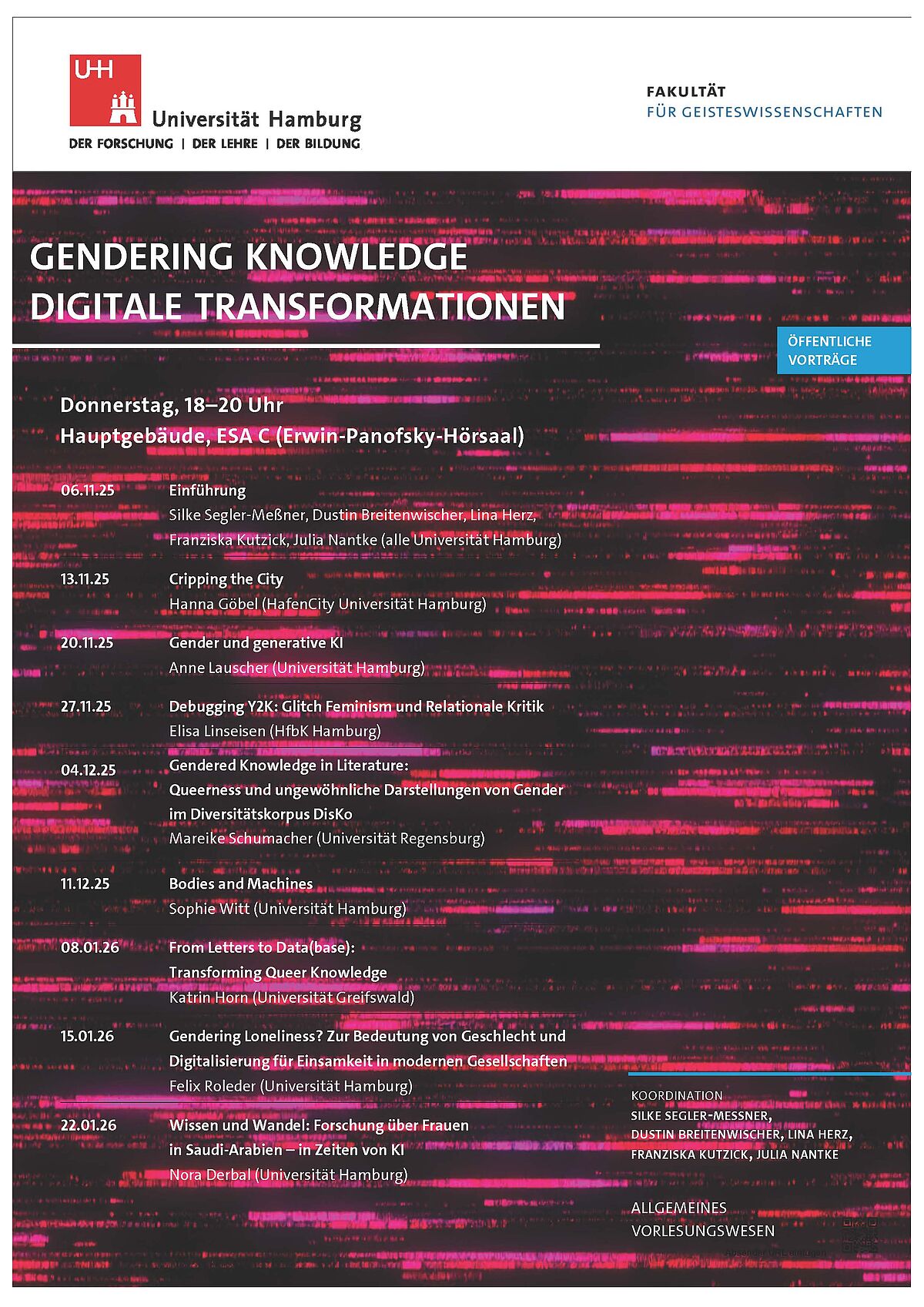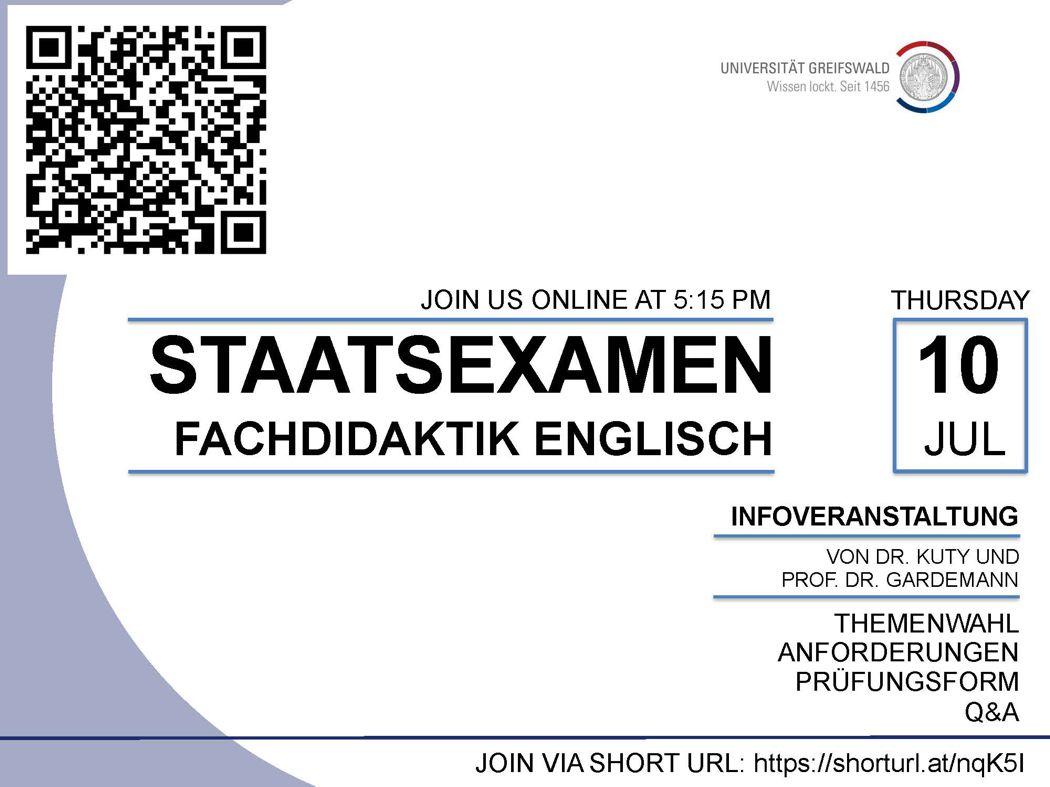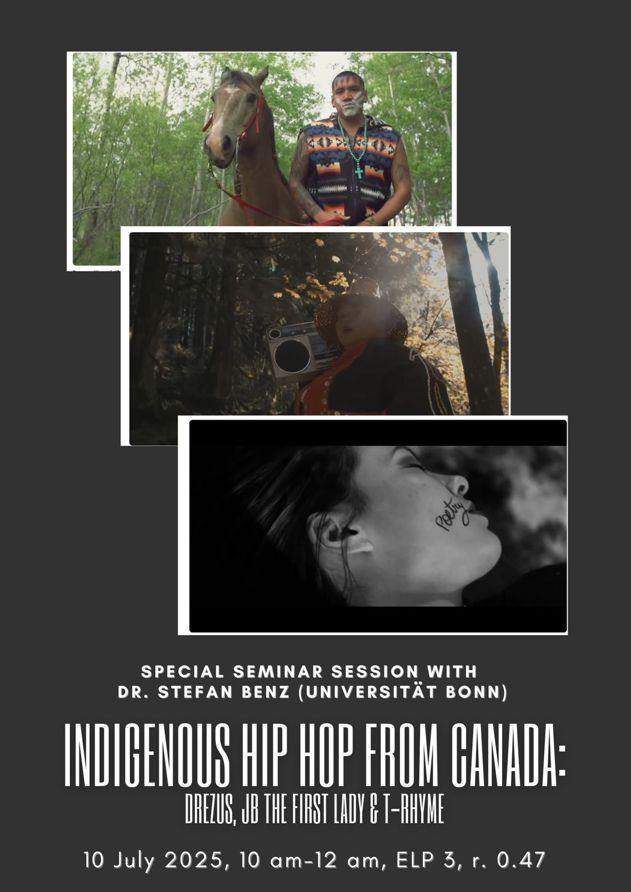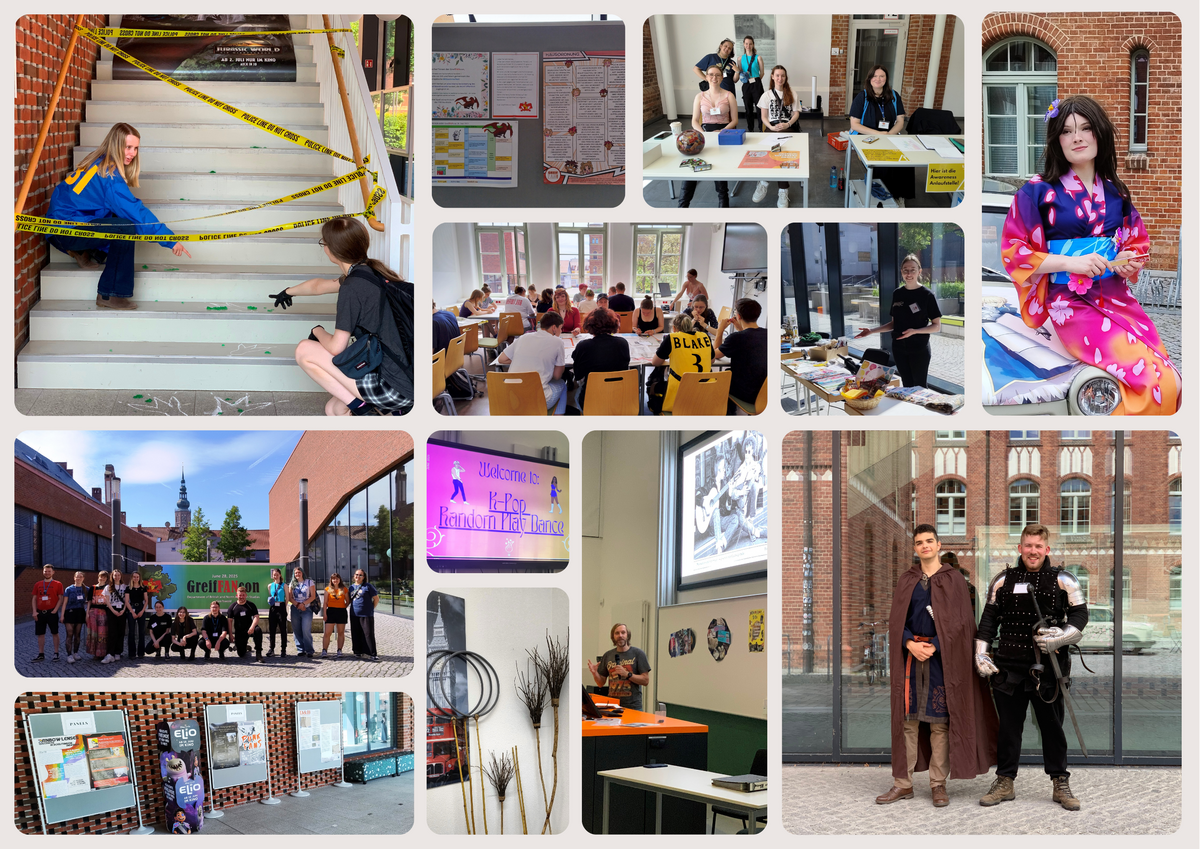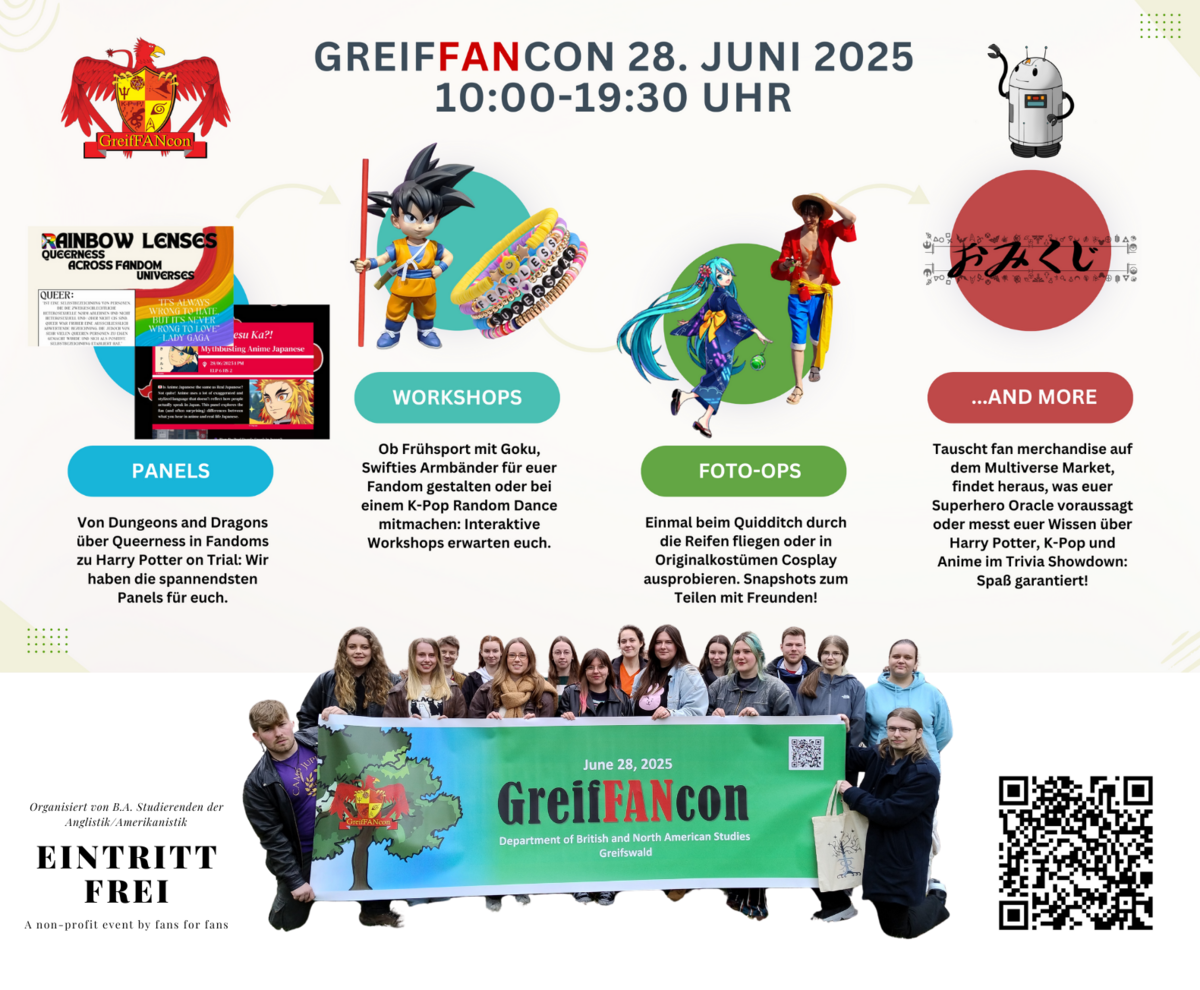Nachrichten-/Veranstaltungsarchiv ab 2025
28.01.2026: Infoveranstaltung: Neustrukturierung der mündlichen Abschlussprüfungen im Staatsexamen (Fachwissenschaft ENGLISCH)
28.1.2026, 17-18 Uhr, ELP3, SR 1.28 und Zoom
Das Institut für Anglistik und Amerikanistik lädt alle Staatsexamenskandidat*innen (und solche, die es werden wollen) zu einer Informationsveranstaltung mit den Prüfenden ein. Die mündliche Prüfung in den Fachwissenschaften ENGLISCH wird ab diesem Semester umstrukturiert und inhaltlich umgestaltet. Ein Info-Blatt mit den neuen Vorgaben wird voraussichtlich ab 26.1. im Moodle-Kurs „Abschlussprüfungen IfAA“ bereitgestellt. In der Info-Veranstaltung am 28.1. werden die neuen Vorgaben zunächst erläutert. Im Anschluss besteht Gelegenheit für Fragen.
An Zoom-Meeting teilnehmen
https://uni-greifswald-de.zoom.us/j/85314347609?pwd=eoNcHs1Xavm3QWuPPjpOpRnnGkT6Ed.1
Meeting-ID: 853 1434 7609
Kenncode: 862771
26.01.2026: Promotionstreff
26.01.2026, 12-14 Uhr, ELP 3, Raum 1.30 (Lernwerkstatt)
Du stehst kurz vor dem Abschluss und hast schon einmal darüber nachgedacht hat, im Bereich Fachdidaktik Englisch zu promovieren? Am 26.01. beantwortet Frau Gardemann alle deine Fragen auf dem Weg zur Promotion.
uni-greifswald-de.zoom.us/j/84010153458: 840 1015 3458Kenncode: 079346
23.01.2026: Infoveranstaltung: Mündliche Examensprüfung (Fachdidaktik ENGLISCH)
23.01.2026, 13-14 Uhr, ONLINE
Dr. Kuty und Prof. Dr. Gardemann informieren über Themenwahl, Anforderungen und das Prüfungsformat. Im Anschluss gibt es Gelegenheit für Fragen.
Die Veranstaltung findet online via Zoom statt.
→ Informationsmaterial zur Veranstaltung (download)
08.01.2026: Gendering Knowledge - Digitale Transfomationen
Referentin: Professorin Katrin Horn
Gastvorlesung im Rahmen der Hamburger Ringvorlesung Gendering Knowledge - Digitale Transfomationen
“From Letters to Data(base). Transforming Queer knowledge”
21.11.2025: Virtual Panel Discussion with Prof. Dr. Katrin Horn on Current Research
Carving Out History: New Research on Emma Stebbins
Emma Stebbins (1815–1882) was one of the most important American sculptors of the nineteenth century. To accompany the first-ever museum exhibition of her work, The Heckscher Museum of Art has just released the scholarly publication Emma Stebbins: Carving Out History (distributed by Penn State University Press). In this virtual lunchtime panel discussion, three of the book’s authors will share new research on Stebbins.
Speakers and Topics:
“At Home Abroad: Emma Stebbins’s Social and Intellectual Circles”
Dr. Katrin Horn, Professor of Gender Studies, University of Greifswald’s Institute for British and North American Studies
“All the Material Things: Industry, Labor, Health, and Environment in Emma Stebbins’s Sculptures”
Dr. Laura Turner Igoe, Gerry and Marguerite Lenfest Chief Curator, James A. Michener Art Museum
“The Better Angels of Our Genders”
Dr. Melissa L. Gustin, Curator of British Art, National Museums Liverpool
Moderated by Dr. Karli Wurzelbacher, Curator and Editor of Emma Stebbins: Carving Out History, The Heckscher Museum of Art
$10 Non-Members, Members Free
Registration required
(for free access code, contact Prof. Dr. Katrin Horn)
05.11.2025: Es wird KALT in Greifswald
Der preisgekrönte Autor Drew Hayden Taylor von der Curve Lake First Nation, Kanada, liest aus seinem neuen Roman "Cold"
05. November 2025, 19 Uhr,
Konferenzsaal, Domstr. 11, 17489 Greifswald
Das Institut für Anglistik und Amerikanistik freut sich, den indigenen kanadischen Autor, Filmemacher und Journalisten Drew Hayden Taylor nach fast drei Jahrzehnten wieder in Greifswald begrüßen zu dürfen – diesmal mit seinem Roman COLD, der Elemente von Thriller, Mystery, Humor und Gesellschaftskritik verbindet und jetzt erstmalig auch ins Deutsche übersetzt wurde. Bereits in den 1990er Jahren stellte Taylor als aufstrebender Dramatiker in Greifswald eines seiner frühen Dramen (Toronto at Dreamer's Rock, 1990) vor. Nun kehrt er als preisgekrönter Dramatiker, Autor und Filmemacher zurück …
07.-16.10.2025: Herzlich Willkommen, Erstis!
Dear first-year students,
We are excited to welcome you at Greifswald University’s Department for British and North American Studies (IfAA) where we will accompany you on your personal and intellectual journey towards your first academic degree, be it a bachelor’s or a teaching degree, in English language, linguistics, literatures, and cultures.
We understand that making that choice to join us at the IfAA is in many ways life-changing and based on hopes to find new inspiration, new friends, and new experiences that will prepare you for a future career. This choice also brings challenges such as managing your life and studies independently, experiencing doubts about your own abilities, and feeling a healthy dose of skepticism about whether this is truly what you want to do and where you want to be.
First-day, first-week, and first-month jitters are nothing unusual. We are here to help you overcome them and take flight. To do so, the faculty of the IfAA has planned special events to ease your transition into student life and studying with us. Please join us during one or more of the following events:
Introduction to Studying English (B.A. Anglistik/Amerikanistik and Lehramt English)
Tuesday, October 7, 2025, 12-1pm, Rubenowstr. 1, HS 3 (Dr. Brauer)
- OR -
Monday, October 13, 2025, 3-4 pm, E.-Lohmeyer-Platz 6, HS 1 (Dr. Kuty)
Individual and Group Support for B.A. Anglistik/Amerikanistik Students (with Dr. Brauer)
Monday, October 13, 2025, 12-2 pm, E.-Lohmeyer-Platz 3, r. 1.13
- OR -
Tuesday, October 14, 2025, 8-10 am, E.-Lohmeyer-Platz 3, r. 1.13
Just come by if you need help or have questions concerning, for example, your semester plan, courses and modules, exams, or Studienleistungen.
MEET & GREET
Monday, October 13, 2025, 2-3 pm, E.-Lohmeyer-Platz 6, HS 1
Get to know your professors in an informal setting.
Study Abroad: Opportunities and Support
Thursday, October 16, 2025, 8-10 am, Rubenowstr. 1, HS 1
Learn about the options for studying at partner universities, participating in Erasmus + exchange programs, or completing internships around the world. This is a joint event with members of the International Office, the departmental exchange coordinator for Erasmus, Yunong Li, and for North America, Dr. Anette Brauer.
10.07.2025: STAATSEXAMEN - Fachdidaktik Englisch
Info-Veranstaltung am 10.07.2025
Referentinnen: Dr. Kuty und Prof. Dr. Gardemann
10.07.2025: Indigenous Hip Hop in Canada: Drezus, JB The First Lady and T-Rhyme
Im Rahmen des Kurses "Indigenous People's Voices: Contemporary Music" laden wir alle Interessierten herzlich zu einer Sonderveranstaltung am
10. Juli 2025 von 10-12 Uhr in den ELP 3, Raum E.47 ein.
Dr. Stefan Benz vom Nordamerikastudienprogramm der Universität Bonn und ausgewiesenen Kenner indigenen Hip Hops wird beispielhaft drei Songs von kanadischen Rappern mit indigenen Wurzeln diskutieren.
Spannend sind dabei die Prozesse kultureller Adaptionen von nicht-indigenen Musikformen durch Musiker*innen mit oft sehr spezifischen politischen Positionen, die sich aus den Traditionen und gesellschaftlichen Erfahrungen indigener Menschen im heutigen Kanada ergeben.
Rückblick: GreifFANcon 2025
Fast ein Jahr lang haben B.A. Anglistik/Amerikanistik Studierenden des 3. Studienjahres im Modul „Applied Studies of English“ individuelle Projekte im Rahmen der Fan Studies geplant und vorbereitet. Am 28. Juni 2025 öffneten sich schließlich die Türen am Loeffler Campus und die Spannung war groß: Würden die Greifswalder Fans von internationaler Pop-Kultur die sorgfältig vorbereiteten Workshops, Panels und Foto-Ops überhaupt besuchen?
Short answer: YES!
Long answer: Viele unserer Gäste wünschten sich bereits eine GreifFANcon 2026.
Von Frühsport mit Goku, Queerness in Fandoms bis zu Dungeons & Dragons fanden sich Fans zusammen, um zu spielen, zu tanzen, zu diskutieren, zu basteln und zu lachen. Besonders überraschend für das studentische Organisationsteam war, wie vielen Cosplayers aus Greifswald, Stralsund und Umgebung in detailreichen Kostümen ein buntes Bild der GreifFANcon auf den Campus zauberten.
Ein ganz herzlicher Dank geht deshalb an alle unsere Besucher*innen aus nah und fern, an Prof. Sebastian Domsch, Prof.in Katrin Horn, Akane Lang, Pride Greifswald, rpd Ostsee, und Thilo Steinke für ihre Unterstützung bei den Panels und Workshops, an das Awareness-Team des FSR Anglistik/Amerikanistik mit Unterstützung des AStA Greifswald, an Vera Hinkeldey vom Greifswalder CineStar, an Joana für die Grafiken, an unsere hoch motivierten Studierenden Elisa, Elisabeth, Emma, Flemming, Hanna, Hannah, Jacqueline, Johanna, Julia, Lea, Leonie, Luise, Maja, Mara, Michael, Moritz, Sophie, Till und Tom sowie ein besonderes Dankschön an unseren tatkräftigen Sekretärinnen des IfAA: Frau Böttger und Frau Möller.
Mit euch/ihnen allen haben wir die Vision einer non-profit Multi-Fandom Convention in Greifswald - von Fans für Fans - Realität werden lassen.
Anette Brauer (Projektleiterin und Trekkie)
https://ifaa.uni-greifswald.de/veranstaltungen/kultur/greiffancon-2025
28.06.2025: GreifFANcon 2025
Fast ein Jahr haben B.A. Anglistik/Amerikanistik Studierenden des 3. Studienjahres im Modul „Applied Studies of English“ individuelle Projekte im Rahmen der Fan Studies geplant und vorbereitet. Nun ist es soweit: Am Samstag, dem 28 Juni werden sie ab 10 Uhr Fans aus nah und fern in Panels und Workshops am Loeffler-Campus willkommen heißen. Wie bei jeder Fan-Convention steht dabei Spaß ganz oben auf der Wunschliste aller Teilnehmenden und Organisator*innen. Fans und alle, die es werden möchten, können sich über ihre Lieblingsfanthemen austauschen und in andere Fandoms und Fanpraktiken interaktiv eintauchen.Mit etlichen Foto-Ops, selbst gebastelten Fan-Crafts und einem Fan Trivia Quiz zum Abschluss des Tages sind tolle Erinnerungen an einen erlebnisreichen Tag garantiert. Und wer aufmerksam ist, wird vielleicht sogar die eine oder den anderen Lehrende*n unseres Instituts als Fans neu entdecken.
→ Join us on June 28, 2025 for the first ever GreifFANcon all day at Löffler-Campus ELP 3 & 6.
https://ifaa.uni-greifswald.de/veranstaltungen/kultur/greiffancon-2025
13.06.2025: Prof. Dr. Katrin Horn hält Keynote auf der Jahrestagung der Deutschen Gesellschaft für Amerikanistik
Die diesjährige Jahrestagung der Deutschen Gesellschaft für Amerikanistik (DGfA) findet vom 12.6. bis 14.6.2025 an der Universität Siegen statt und widmet sich dem Thema Archiving America/American Archives. Am Freitag, 13.6., hält Prof. Dr. Katrin Horn eine der Keynote-Vorträge und spricht unter dem Titel “Eavesdropping on the (Queer) Past: On Epistolary Intimacy and Connectivity” über ihre aktuelle Forschung.
Weitere Infos unter: https://www.uni-siegen.de/phil/anglistik/dgfa2025/keynotes.html?lang=de
03.06.2025: Gastvortrag Prof. Dr. M. Bator: "Obsolete Scandinavian loanwords in English – revisited"
14.15 -15.45 Uhr
Ort: Greifswald, Ernst-Lohmeyer-Platz 3, HÖRSAAL 2.33
Referentin: Prof. Dr. Magdalena Bator, Posen
The North Germanic languages, next to the Romance languages, are one of the most important source of foreign element in English. Among these, the early Scandinavian influences (i.e. influence coming from early West Norse and East Norse varieties which were in contact with English) are definitely the most significant ones. They result mostly from the Viking invasions and the subsequent Norse settlement in the British Isles.
After a brief presentation of the circumstances in which these languages - early Scandinavian and English - were in contact, we will discuss a variety of influences still visible in English. Then, we will concentrate on those Norse introductions to English which did not make it through the ages and either disappeared from the language, got limited to dialectal use or after a period of absence reappeared in English.
25.01.2025: STAATSEXAMEN - Linguistik (mündlich)
Info-Veranstaltung
25. Januar 2025, 16 Uhr
Referentin: Frau Dr. Julia Landmann
Digitale Informationsveranstaltung (via Zoom) zu Fragen rund um die im Sommer anstehende mündliche Staatsexamensprüfung (Linguistik).
24.01.2025: STAATSEXAMEN - Fachdidaktik Englisch
Info-Veranstaltung
Referentinnen: Dr. Kuty und Prof. Dr. Gardemann
21.01.2025: Gastvortrag Dr. K. Motyl - FEMINISTS KNOW THEY ARE LYING
DIGITAL ANTI-FEMINISM AS THE ALT-RIGHT’S MEDIAL AND IDEOLOGICAL VANGUARD

Guest Lecture by
Dr. Katharina Motyl (Mannheim)
Tuesday, January 21, 2:15 pm
ELP 3, Room 1.29 (No registration necessary)
This talk draws on the rhetorical and visual analysis of written posts and multimodal memes published in anti-feminist online forums such as reddit to argue that digital anti-feminism constitutes a space in which some users collectively radicalize to embrace alt-right ideologies at large (or are purposefully enticed to radicalize by alt-right activists, for instance, by redpilling).
After briefly characterizing the groups constituting the manosphere, Dr. Motyl shares three observations regarding the interconnections between digital media ecologies, anti-feminism, and the alt-right: First, the anonymity and the networked harassment that web 2.0 afford have greatly radicalized anti-feminist and anti-gender discourses. Second, anti-feminism and anti-genderism function as the ideological glue that binds the various groups constituting the alt-right together. Third, since the late aughts, anti-feminism and anti-gender politics have moved from the margins of the internet to the center of Western societies and polities – this ‘migration’ has moved the boundaries of what is sayable in parliaments and other ‘offline’ spaces of political discourse. The talk’s third part considers the rhetorical strategies, aesthetics, and affective appeals that select anti-feminist social-media posts deploy to conjure masculine and heterosexual domination and to entice individual, socially isolated users to experience empowerment by joining a (virtual, yet real) collective. The antifeminist vanguard of the alt-right, in short, succeeds in convincing users that their feelings of marginalization constitute subversive knowledge regarding the true power dynamics in Western societies, which not only oppress men, but which also privilege ethnic and racial minorities over white people, who will soon be ‘replaced’ unless they start resisting.
Call for Applications: Erasmus+ Studying Abroad 2025-2026
In the academic year 2025-2026, the Department of British and North American Studies provides the following Erasmus+ Studying Abroad opportunities:
For questions regarding the Erasmus+ program in general, please attend the online consultation offered by the International Office or contact the Departmental Exchange Coordinator, Mr. Li (yunong.liuni-greifswaldde).
Interested applicants should send the following application documents in one PDF file named after “LASTNAME_ERASMUS_2526” to Mr. Li (yunong.liuni-greifswaldde).
Application deadline: End of day on 05.01.2025
Application documents:
- Finished application form
- Letter of motivation in English, transcripts of Records at the University of Greifswald
- Proof of language competence
- Curriculum vitae
- Other related documents (e.g. on extracurricular commitments, volunteering, etc.)

